Research Paper: Free Will
VerifiedAdded on 2019/09/30
|6
|1490
|309
Essay
AI Summary
This essay investigates the question of free will, arguing against its existence. It reviews philosophical and scientific perspectives, citing studies on the neurological processes preceding conscious decision-making. The essay challenges the intuitive feeling of free will, suggesting that our choices are either determined by prior events or random. The case of Bashar al-Assad is used as an example to illustrate how seemingly free choices can have devastating consequences. The conclusion emphasizes the potential negative impacts of believing in free will and its implications for moral responsibility.
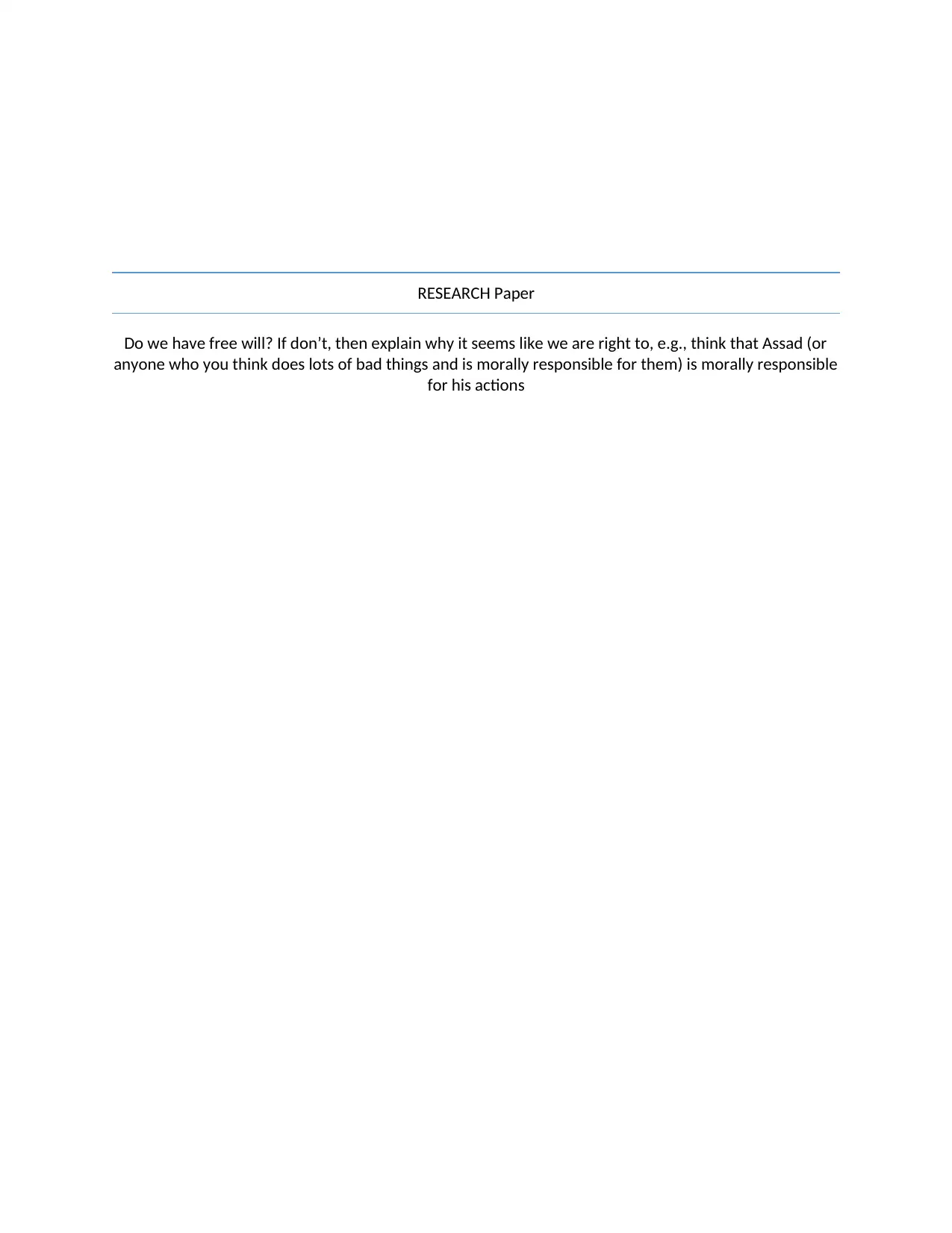
RESEARCH Paper
Do we have free will? If don’t, then explain why it seems like we are right to, e.g., think that Assad (or
anyone who you think does lots of bad things and is morally responsible for them) is morally responsible
for his actions
Do we have free will? If don’t, then explain why it seems like we are right to, e.g., think that Assad (or
anyone who you think does lots of bad things and is morally responsible for them) is morally responsible
for his actions
Paraphrase This Document
Need a fresh take? Get an instant paraphrase of this document with our AI Paraphraser
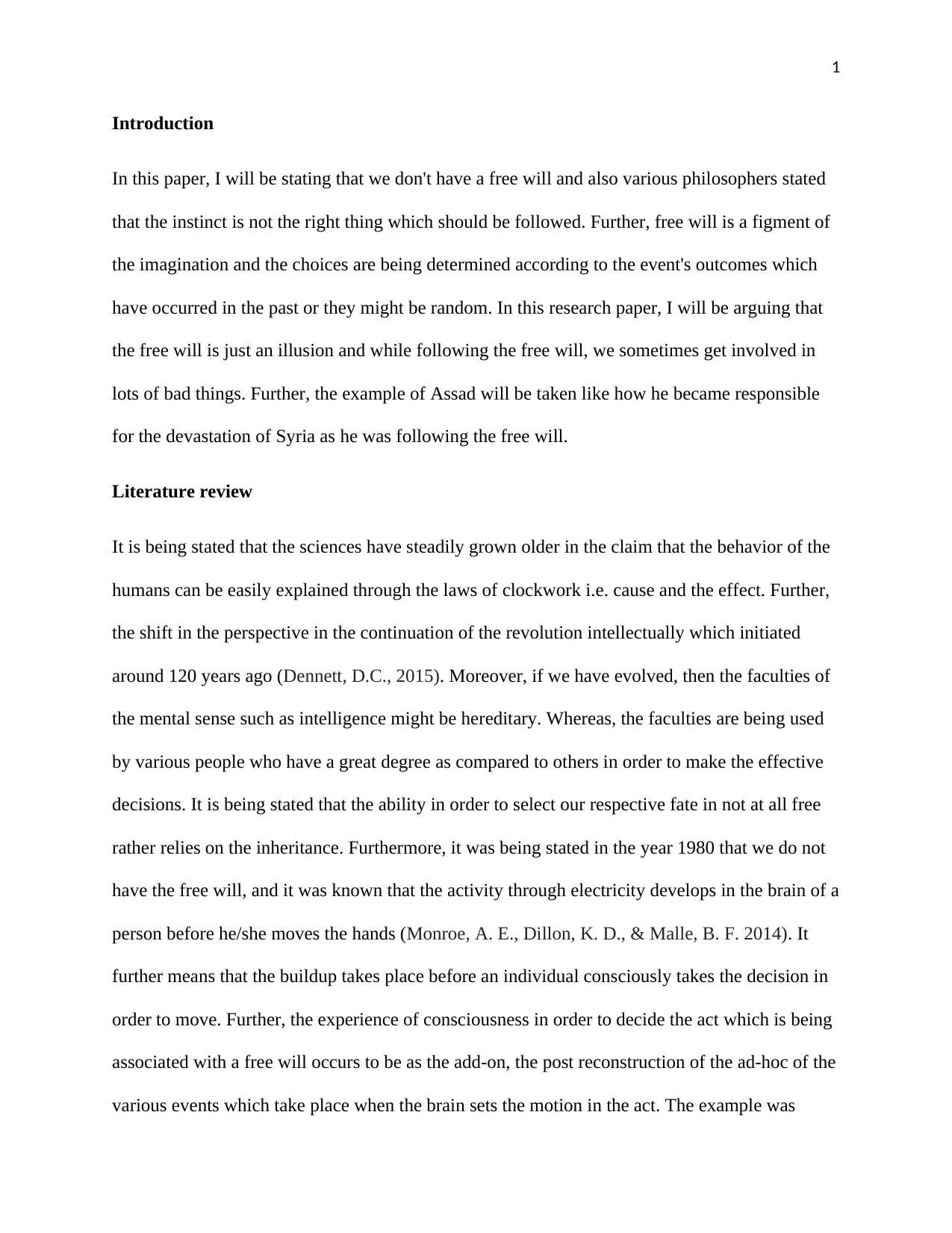
1
Introduction
In this paper, I will be stating that we don't have a free will and also various philosophers stated
that the instinct is not the right thing which should be followed. Further, free will is a figment of
the imagination and the choices are being determined according to the event's outcomes which
have occurred in the past or they might be random. In this research paper, I will be arguing that
the free will is just an illusion and while following the free will, we sometimes get involved in
lots of bad things. Further, the example of Assad will be taken like how he became responsible
for the devastation of Syria as he was following the free will.
Literature review
It is being stated that the sciences have steadily grown older in the claim that the behavior of the
humans can be easily explained through the laws of clockwork i.e. cause and the effect. Further,
the shift in the perspective in the continuation of the revolution intellectually which initiated
around 120 years ago (Dennett, D.C., 2015). Moreover, if we have evolved, then the faculties of
the mental sense such as intelligence might be hereditary. Whereas, the faculties are being used
by various people who have a great degree as compared to others in order to make the effective
decisions. It is being stated that the ability in order to select our respective fate in not at all free
rather relies on the inheritance. Furthermore, it was being stated in the year 1980 that we do not
have the free will, and it was known that the activity through electricity develops in the brain of a
person before he/she moves the hands (Monroe, A. E., Dillon, K. D., & Malle, B. F. 2014). It
further means that the buildup takes place before an individual consciously takes the decision in
order to move. Further, the experience of consciousness in order to decide the act which is being
associated with a free will occurs to be as the add-on, the post reconstruction of the ad-hoc of the
various events which take place when the brain sets the motion in the act. The example was
Introduction
In this paper, I will be stating that we don't have a free will and also various philosophers stated
that the instinct is not the right thing which should be followed. Further, free will is a figment of
the imagination and the choices are being determined according to the event's outcomes which
have occurred in the past or they might be random. In this research paper, I will be arguing that
the free will is just an illusion and while following the free will, we sometimes get involved in
lots of bad things. Further, the example of Assad will be taken like how he became responsible
for the devastation of Syria as he was following the free will.
Literature review
It is being stated that the sciences have steadily grown older in the claim that the behavior of the
humans can be easily explained through the laws of clockwork i.e. cause and the effect. Further,
the shift in the perspective in the continuation of the revolution intellectually which initiated
around 120 years ago (Dennett, D.C., 2015). Moreover, if we have evolved, then the faculties of
the mental sense such as intelligence might be hereditary. Whereas, the faculties are being used
by various people who have a great degree as compared to others in order to make the effective
decisions. It is being stated that the ability in order to select our respective fate in not at all free
rather relies on the inheritance. Furthermore, it was being stated in the year 1980 that we do not
have the free will, and it was known that the activity through electricity develops in the brain of a
person before he/she moves the hands (Monroe, A. E., Dillon, K. D., & Malle, B. F. 2014). It
further means that the buildup takes place before an individual consciously takes the decision in
order to move. Further, the experience of consciousness in order to decide the act which is being
associated with a free will occurs to be as the add-on, the post reconstruction of the ad-hoc of the
various events which take place when the brain sets the motion in the act. The example was
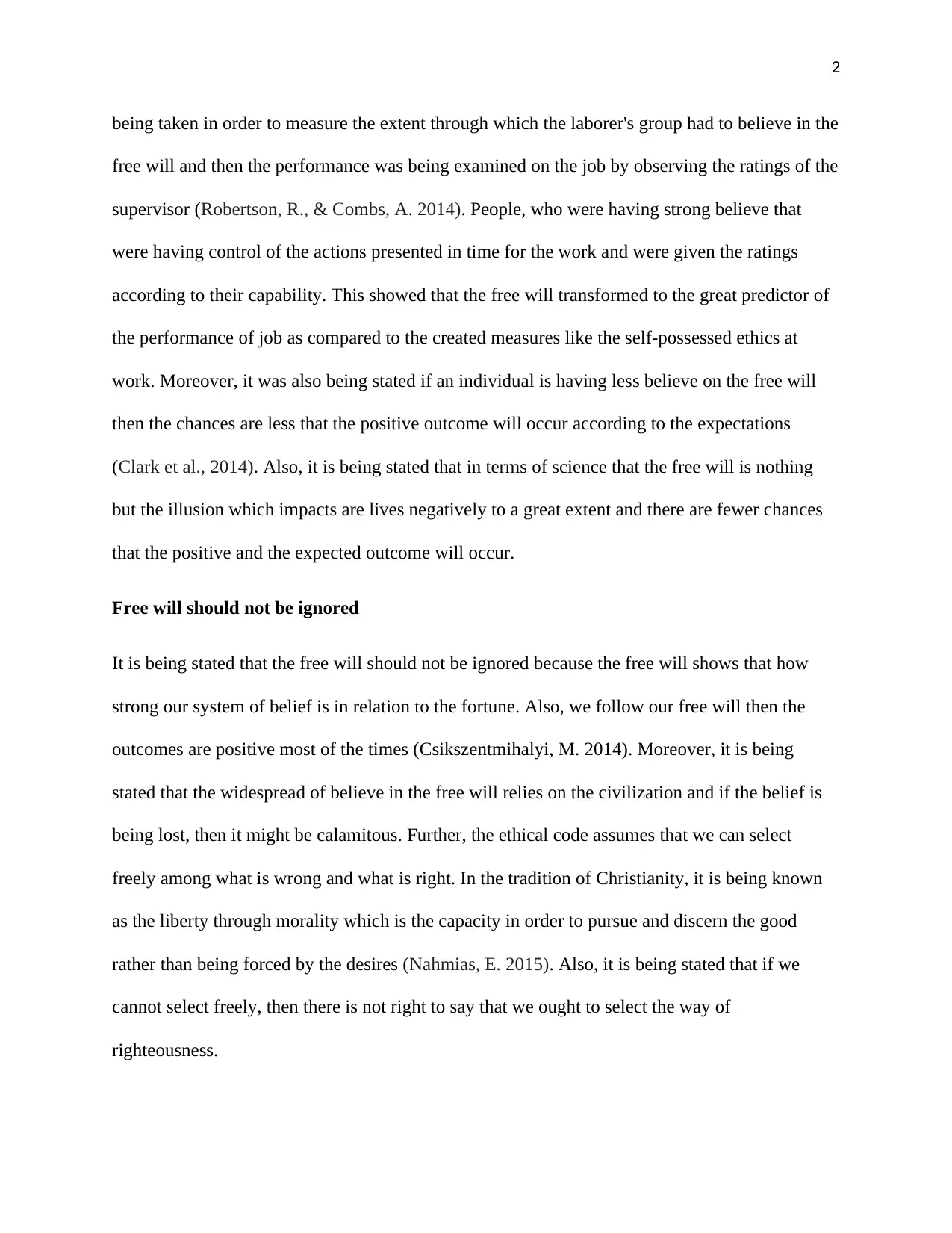
2
being taken in order to measure the extent through which the laborer's group had to believe in the
free will and then the performance was being examined on the job by observing the ratings of the
supervisor (Robertson, R., & Combs, A. 2014). People, who were having strong believe that
were having control of the actions presented in time for the work and were given the ratings
according to their capability. This showed that the free will transformed to the great predictor of
the performance of job as compared to the created measures like the self-possessed ethics at
work. Moreover, it was also being stated if an individual is having less believe on the free will
then the chances are less that the positive outcome will occur according to the expectations
(Clark et al., 2014). Also, it is being stated that in terms of science that the free will is nothing
but the illusion which impacts are lives negatively to a great extent and there are fewer chances
that the positive and the expected outcome will occur.
Free will should not be ignored
It is being stated that the free will should not be ignored because the free will shows that how
strong our system of belief is in relation to the fortune. Also, we follow our free will then the
outcomes are positive most of the times (Csikszentmihalyi, M. 2014). Moreover, it is being
stated that the widespread of believe in the free will relies on the civilization and if the belief is
being lost, then it might be calamitous. Further, the ethical code assumes that we can select
freely among what is wrong and what is right. In the tradition of Christianity, it is being known
as the liberty through morality which is the capacity in order to pursue and discern the good
rather than being forced by the desires (Nahmias, E. 2015). Also, it is being stated that if we
cannot select freely, then there is not right to say that we ought to select the way of
righteousness.
being taken in order to measure the extent through which the laborer's group had to believe in the
free will and then the performance was being examined on the job by observing the ratings of the
supervisor (Robertson, R., & Combs, A. 2014). People, who were having strong believe that
were having control of the actions presented in time for the work and were given the ratings
according to their capability. This showed that the free will transformed to the great predictor of
the performance of job as compared to the created measures like the self-possessed ethics at
work. Moreover, it was also being stated if an individual is having less believe on the free will
then the chances are less that the positive outcome will occur according to the expectations
(Clark et al., 2014). Also, it is being stated that in terms of science that the free will is nothing
but the illusion which impacts are lives negatively to a great extent and there are fewer chances
that the positive and the expected outcome will occur.
Free will should not be ignored
It is being stated that the free will should not be ignored because the free will shows that how
strong our system of belief is in relation to the fortune. Also, we follow our free will then the
outcomes are positive most of the times (Csikszentmihalyi, M. 2014). Moreover, it is being
stated that the widespread of believe in the free will relies on the civilization and if the belief is
being lost, then it might be calamitous. Further, the ethical code assumes that we can select
freely among what is wrong and what is right. In the tradition of Christianity, it is being known
as the liberty through morality which is the capacity in order to pursue and discern the good
rather than being forced by the desires (Nahmias, E. 2015). Also, it is being stated that if we
cannot select freely, then there is not right to say that we ought to select the way of
righteousness.
⊘ This is a preview!⊘
Do you want full access?
Subscribe today to unlock all pages.

Trusted by 1+ million students worldwide
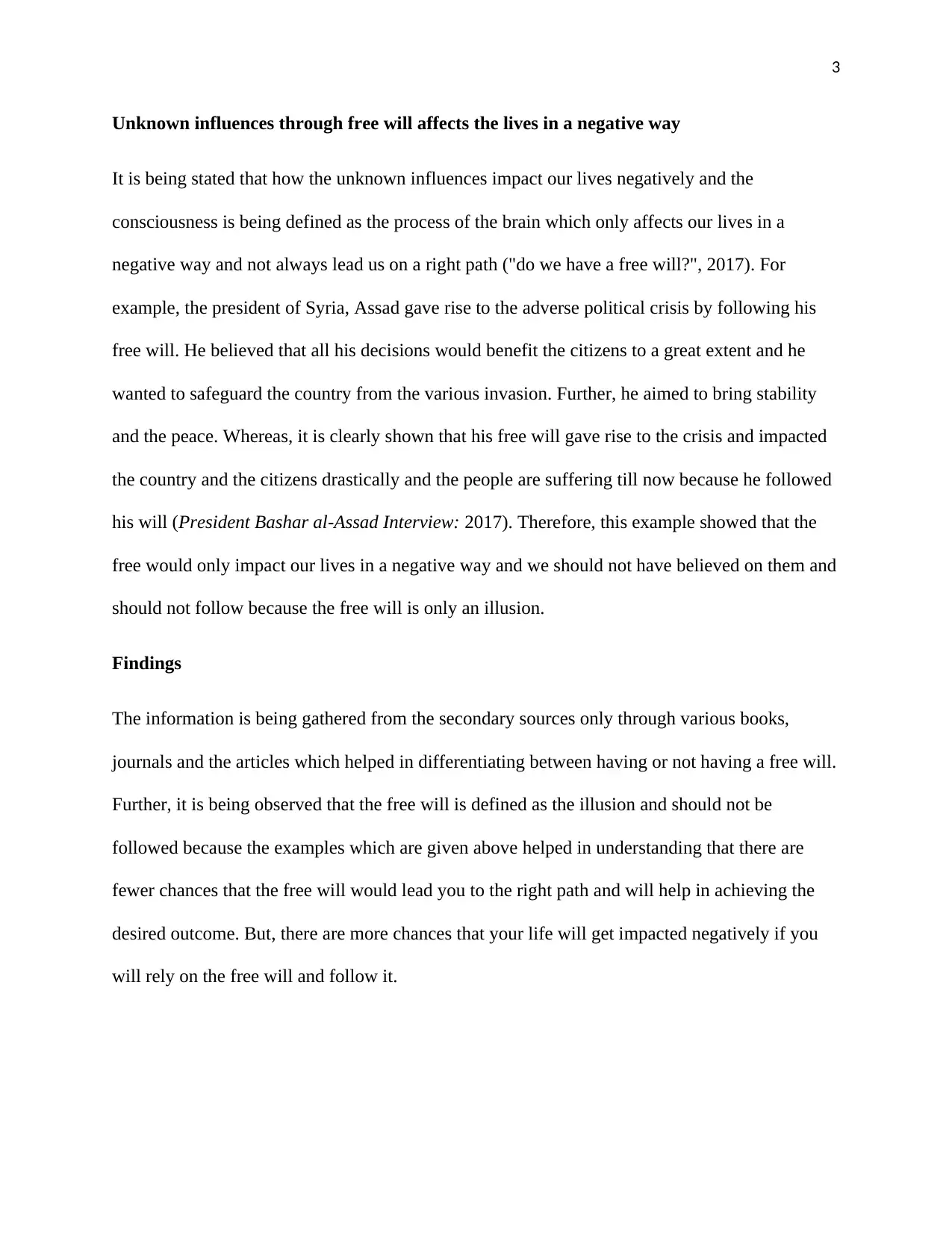
3
Unknown influences through free will affects the lives in a negative way
It is being stated that how the unknown influences impact our lives negatively and the
consciousness is being defined as the process of the brain which only affects our lives in a
negative way and not always lead us on a right path ("do we have a free will?", 2017). For
example, the president of Syria, Assad gave rise to the adverse political crisis by following his
free will. He believed that all his decisions would benefit the citizens to a great extent and he
wanted to safeguard the country from the various invasion. Further, he aimed to bring stability
and the peace. Whereas, it is clearly shown that his free will gave rise to the crisis and impacted
the country and the citizens drastically and the people are suffering till now because he followed
his will (President Bashar al-Assad Interview: 2017). Therefore, this example showed that the
free would only impact our lives in a negative way and we should not have believed on them and
should not follow because the free will is only an illusion.
Findings
The information is being gathered from the secondary sources only through various books,
journals and the articles which helped in differentiating between having or not having a free will.
Further, it is being observed that the free will is defined as the illusion and should not be
followed because the examples which are given above helped in understanding that there are
fewer chances that the free will would lead you to the right path and will help in achieving the
desired outcome. But, there are more chances that your life will get impacted negatively if you
will rely on the free will and follow it.
Unknown influences through free will affects the lives in a negative way
It is being stated that how the unknown influences impact our lives negatively and the
consciousness is being defined as the process of the brain which only affects our lives in a
negative way and not always lead us on a right path ("do we have a free will?", 2017). For
example, the president of Syria, Assad gave rise to the adverse political crisis by following his
free will. He believed that all his decisions would benefit the citizens to a great extent and he
wanted to safeguard the country from the various invasion. Further, he aimed to bring stability
and the peace. Whereas, it is clearly shown that his free will gave rise to the crisis and impacted
the country and the citizens drastically and the people are suffering till now because he followed
his will (President Bashar al-Assad Interview: 2017). Therefore, this example showed that the
free would only impact our lives in a negative way and we should not have believed on them and
should not follow because the free will is only an illusion.
Findings
The information is being gathered from the secondary sources only through various books,
journals and the articles which helped in differentiating between having or not having a free will.
Further, it is being observed that the free will is defined as the illusion and should not be
followed because the examples which are given above helped in understanding that there are
fewer chances that the free will would lead you to the right path and will help in achieving the
desired outcome. But, there are more chances that your life will get impacted negatively if you
will rely on the free will and follow it.
Paraphrase This Document
Need a fresh take? Get an instant paraphrase of this document with our AI Paraphraser
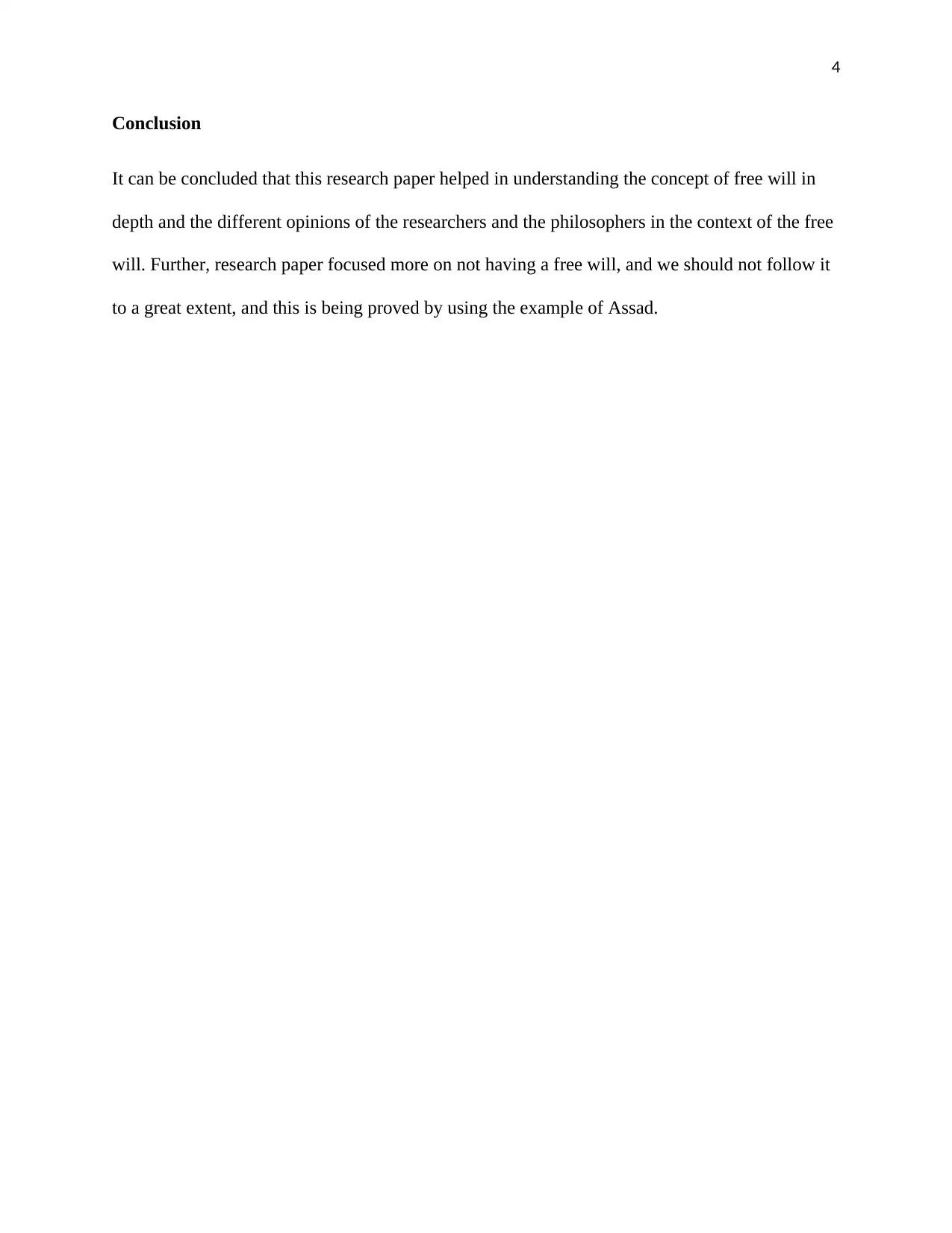
4
Conclusion
It can be concluded that this research paper helped in understanding the concept of free will in
depth and the different opinions of the researchers and the philosophers in the context of the free
will. Further, research paper focused more on not having a free will, and we should not follow it
to a great extent, and this is being proved by using the example of Assad.
Conclusion
It can be concluded that this research paper helped in understanding the concept of free will in
depth and the different opinions of the researchers and the philosophers in the context of the free
will. Further, research paper focused more on not having a free will, and we should not follow it
to a great extent, and this is being proved by using the example of Assad.
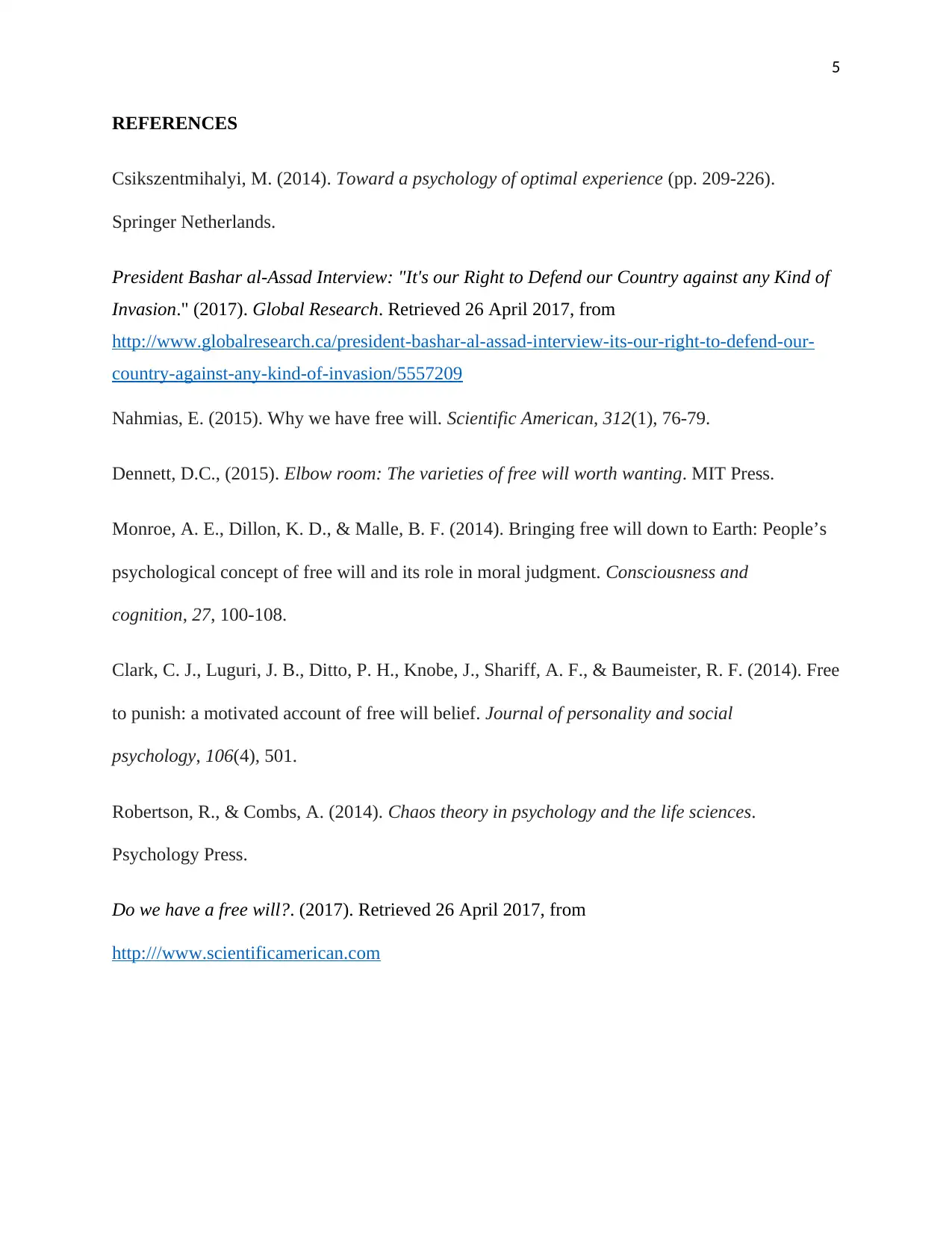
5
REFERENCES
Csikszentmihalyi, M. (2014). Toward a psychology of optimal experience (pp. 209-226).
Springer Netherlands.
President Bashar al-Assad Interview: "It's our Right to Defend our Country against any Kind of
Invasion." (2017). Global Research. Retrieved 26 April 2017, from
http://www.globalresearch.ca/president-bashar-al-assad-interview-its-our-right-to-defend-our-
country-against-any-kind-of-invasion/5557209
Nahmias, E. (2015). Why we have free will. Scientific American, 312(1), 76-79.
Dennett, D.C., (2015). Elbow room: The varieties of free will worth wanting. MIT Press.
Monroe, A. E., Dillon, K. D., & Malle, B. F. (2014). Bringing free will down to Earth: People’s
psychological concept of free will and its role in moral judgment. Consciousness and
cognition, 27, 100-108.
Clark, C. J., Luguri, J. B., Ditto, P. H., Knobe, J., Shariff, A. F., & Baumeister, R. F. (2014). Free
to punish: a motivated account of free will belief. Journal of personality and social
psychology, 106(4), 501.
Robertson, R., & Combs, A. (2014). Chaos theory in psychology and the life sciences.
Psychology Press.
Do we have a free will?. (2017). Retrieved 26 April 2017, from
http:///www.scientificamerican.com
REFERENCES
Csikszentmihalyi, M. (2014). Toward a psychology of optimal experience (pp. 209-226).
Springer Netherlands.
President Bashar al-Assad Interview: "It's our Right to Defend our Country against any Kind of
Invasion." (2017). Global Research. Retrieved 26 April 2017, from
http://www.globalresearch.ca/president-bashar-al-assad-interview-its-our-right-to-defend-our-
country-against-any-kind-of-invasion/5557209
Nahmias, E. (2015). Why we have free will. Scientific American, 312(1), 76-79.
Dennett, D.C., (2015). Elbow room: The varieties of free will worth wanting. MIT Press.
Monroe, A. E., Dillon, K. D., & Malle, B. F. (2014). Bringing free will down to Earth: People’s
psychological concept of free will and its role in moral judgment. Consciousness and
cognition, 27, 100-108.
Clark, C. J., Luguri, J. B., Ditto, P. H., Knobe, J., Shariff, A. F., & Baumeister, R. F. (2014). Free
to punish: a motivated account of free will belief. Journal of personality and social
psychology, 106(4), 501.
Robertson, R., & Combs, A. (2014). Chaos theory in psychology and the life sciences.
Psychology Press.
Do we have a free will?. (2017). Retrieved 26 April 2017, from
http:///www.scientificamerican.com
⊘ This is a preview!⊘
Do you want full access?
Subscribe today to unlock all pages.

Trusted by 1+ million students worldwide
1 out of 6